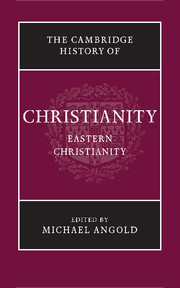Book contents
- Frontmatter
- PART I THE ECUMENICAL PATRIARCHATE
- 1 The Byzantine Commonwealth 1000–1550
- 2 Byzantium and the west 1204–1453
- 3 The culture of lay piety in medieval Byzantium 1054–1453
- 4 The rise of hesychasm
- 5 Art and liturgy in the later Byzantine Empire
- 6 Mount Athos and the Ottomans c. 1350–1550
- 7 The Great Church in captivity 1453–1586
- 8 Orthodoxy and the west: Reformation to Enlightenment
- 9 Bars’kyj and the Orthodox community
- 10 The legacy of the French Revolution: Orthodoxy and nationalism
- PART II THE RUSSIAN CHURCH
- PART III EASTERN CHRISTIANITIES
- PART IV THE MODERN WORLD
- Bibliography
- Index
- References
2 - Byzantium and the west 1204–1453
from PART I - THE ECUMENICAL PATRIARCHATE
Published online by Cambridge University Press: 28 March 2008
- Frontmatter
- PART I THE ECUMENICAL PATRIARCHATE
- 1 The Byzantine Commonwealth 1000–1550
- 2 Byzantium and the west 1204–1453
- 3 The culture of lay piety in medieval Byzantium 1054–1453
- 4 The rise of hesychasm
- 5 Art and liturgy in the later Byzantine Empire
- 6 Mount Athos and the Ottomans c. 1350–1550
- 7 The Great Church in captivity 1453–1586
- 8 Orthodoxy and the west: Reformation to Enlightenment
- 9 Bars’kyj and the Orthodox community
- 10 The legacy of the French Revolution: Orthodoxy and nationalism
- PART II THE RUSSIAN CHURCH
- PART III EASTERN CHRISTIANITIES
- PART IV THE MODERN WORLD
- Bibliography
- Index
- References
Summary
One episode presents many of the recurring features of the last phase of Byzantine relations with the west. On 12 December 1452 in the teeth of popular hostility St Sophia witnessed the much-delayed proclamation of the union of Florence. It was the work of the papal legate Isidore of Kiev, whose recent arrival in Constantinople gave new purpose to the unionist cause. He was able to cajole the emperor Constantine XI Palaiologos (1448–53) into staging the proclamation of the union of churches. Isidore understood how little enthusiasm there was among the Greeks of Constantinople for union with Rome. Most preferred to put their trust in their icons rather than in help from the west. Even those who participated in the service of reunion justified their presence in terms of expediency and urged opponents of the union to wait until the present crisis had passed. This incident illustrates the popular opposition to union; the reluctant realism among the ruling elite, which dictated lip service to the union as away of securing western aid; but also the energy and idealism of a Greek convert to Rome, who saw in the union of churches not only a return to the true faith, but also a path to regeneration. It is the final feature that is the most surprising. Why over two centuries should so many of the ablest and most attractive Byzantines have turned to the Latin West, not in a spirit of expediency, but out of idealism? There is no one answer. But it was part of a growing appreciation by influential members of the Byzantine elite of Latin culture.
- Type
- Chapter
- Information
- The Cambridge History of Christianity , pp. 53 - 78Publisher: Cambridge University PressPrint publication year: 2006
References
- 5
- Cited by

